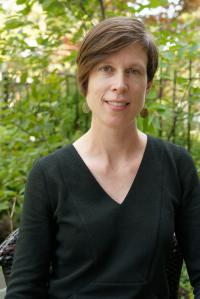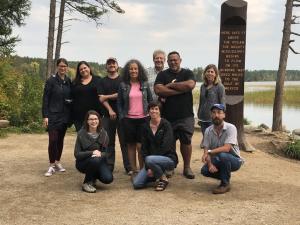Changing Climates in Humanities Education
Research Identifies Pathways for Scalable Graduate Training

Do you believe collaboration is a transferable skill for graduate students? Kelly Wisecup does. While working with her team on the Grand Research Challenge (GRC)-funded project "Indigenous Art and Activism in Changing Climates," Wisecup began to reimagine how to equip students to succeed, both within the academy and beyond. "Indigenous Art and Activism” is one of a group of GRC projects supported by the Humanities Without Walls (HWW) consortium.
“The reproductive model of graduate training does not really work anymore,” said Wisecup, who is a professor of English at Northwestern University and principal investigator on the GRC project. “I'm not training people who are going to be a version of me in the field.”

of Agleska Cohen-Rencountre.
Because the project’s focus was working with Indigenous communities and artists in the Mississippi River Valley, the skills required for doing truly reciprocal and collaborative research prompted Wisecup to rethink current accepted practices for graduate training.
She began to reconceptualize both the role of traditional research methodologies and how to support graduate student scholars more equitably on the project. HWW funding allowed for collaboration across time, which, according to Wisecup, “transformed the ways that I was able to work with the graduate students and with the other faculty.”
Reflecting on the multi-year project, Wisecup believes that the GRC award afforded the project team valuable space to rethink and rework presumed ways of doing academic research and writing. This reshaping allowed them to understand what a cohort could look like and accomplish. Collaboration, as Wisecup said, functions as “…a kind of adeptness or skill with translation” that can be learned and improved just like any other skill.
Part of that collaborative skill building meant the team’s focus, following Indigenous Studies best practices, was from the beginning more people- and method-driven rather than centered around preconceived outcomes. Wisecup and the project team members ultimately chose not to foreground existing expertise, but instead to work together to create it as part of the process, enabling graduate students to learn and research alongside faculty members in a cooperative cohort model.
Ultimately, part of what emerged was a collaboratively-produced website of essays and interviews with artists and activists that emerged out of the team’s collective expertise.
By Heather Ennis and Bridget Sullivan